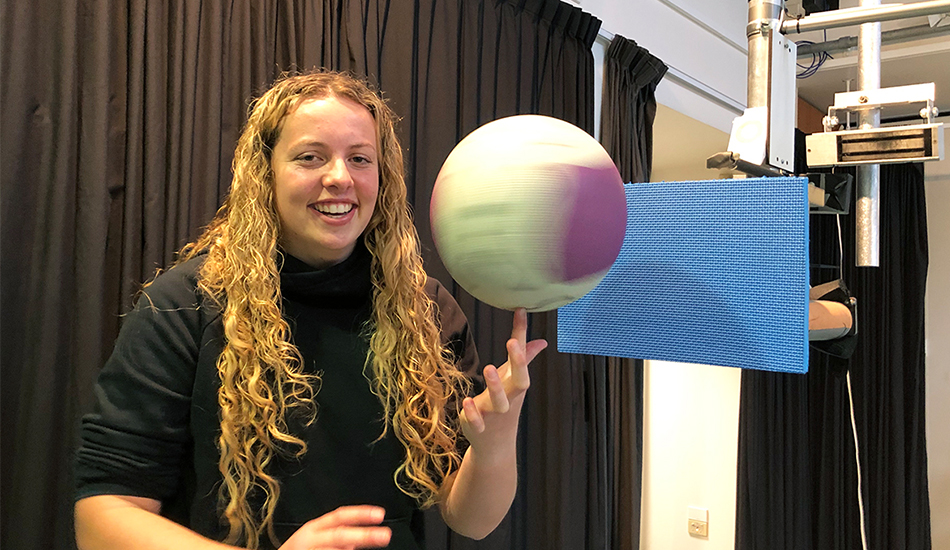
Master of Science in Sport, Exercise and Health student Jess Fuller in the biomechanics lab at the School of Physical Education, Sport and Exercise Sciences.
With her contagious energy, it’s little surprise to learn that Master of Science in Sport, Exercise and Health student Jess Fuller plans to attend as many games as possible in the upcoming FIFA Women’s World Cup starting tomorrow.
For Jess, football weaves and connects all aspects of her life. She kicked her first ball at the age of eight, started coaching at 14, and more recently played in the Otago University AFC Women’s premier team. Now Jess is the assistant coach for both the Women’s and Men’s varsity teams and she’s the head coach for Southern United U18s’ Development team.
“Growing up I had a real interest in sports, coaching and the behind-the-scenes practices to maximise performance, which coupled with my love for science in school, made sports science a no-brainer,” Jess says.
Now researching the topic of concussion in football players for her master’s, her studies dance alongside her role as Southern Football’s Girls and Women’s Development officer where she’s using her passion of the game to inspire a new generation of girls.
“I also want to provide those already involved in the game with as many opportunities to reach their full potential and enjoy the game they love. Whether that’s through playing, coaching, or refereeing it provides an awesome opportunity to bring the community together through football.”
The culmination of her work over the last two years has resulted in the introduction this year of a girls-only league (spanning U6 to U13 age groups) in Dunedin that’s attracted a new generation of girls to the sport as an option for those who a mixed environment doesn’t work for.
Jess’s passion for the game also delivered her the topic for her postgraduate research on football concussion, which she’s studying for in the biomechanics lab in the School of Physical Education, Sport and Exercise Sciences.
Jess explains she came across her topic while coaching during the post COVID-19 football season, when she was amazed by the amount of disruption caused by concussion.
“Female football players have shown a higher incidence of concussions compared to their males, and my research aims to identify the factors that influence head and neck control in football and their role in reducing the force experienced during impacts.”
Her research to date has involved assessing around 50 players in the lab for neck strength, and rate of force development, and currently involves the detailed analysis of 700 videos.
Jess explains that by uncovering the differences between males and females in head and neck control and identifying variations in neck strength characteristics, the research will inform the development of targeted injury prevention strategies, including how players can become more robust to unexpected collisions.
Associate Professor Melanie Bussey, who is supervising the work and is a specialist researcher on head impacts in sport, saysJess's passion for football, coupled with her scientific research, coaching experience, and community engagement, showcases her commitment to the sport and her determination to make a positive impact.
“Head acceleration research that specifically targets female athletes is vital for closing the gender gap in sports medicine, improving player safety, and advancing our understanding of concussion risk in the female athlete population,” Associate Professor Bussey says. “Undoubtedly, Jess’s work will contribute significantly to improving player welfare and female-specific training strategies.”
With the FIFA tournament about to kick-off, Jess is finalising her travel schedule to attend as many games as possible. She’s off to the opening game in Auckland tomorrow, will attend all matches in Dunedin, and no one is going to get in the way of her making the final in Sydney.
With all the work Jess has done for the sport to date, attending the FIFA games will be to simply “celebrate all the work that’s taken place, and just be a fan by enjoying football for the game’s sake”.
“My hope is the tournament will inspire future generations to not only get involved in the game but support and value women’s sport from the international stage all the way to grassroots level.”
Kōrero by Guy Frederick, Sciences Communications Adviser

Jess outlining some game strategies in one of her football coaching roles. Image background digitally extended.